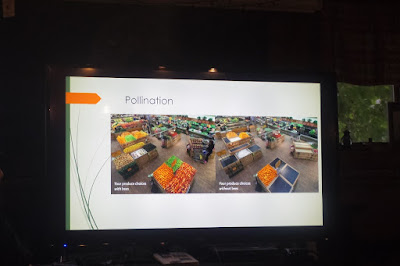Yesterday, Dr. Tara Cornelisse came to Riverside-Salem Environmental Chapel in Grand Island to talk about insects. Tara is assistant professor at Canisius College, where she teaches courses in animal behavior, ecology, and conservation. She is working on a monarch butterfly habitat project in Western New York and she is a member of the board of directors for the Pollinator Conservation Board.
Parts one and two of Insects and their Conservation can be found here:
What's all the buzz? Insects and their Conservation (part one)
Bees and Butterflies: Insects and their Conservation part two)
In autumn, as the seasons change, there are things that can be done to help support insects. You're probably asking: why should we help to support insects? Well, probably because we really can't function without them. According to E. O. Wilson, "If we were to wipe out insects alone on this planet, the rest of life and humanity would mostly disappear from the land. Within a few months."
Here are some of the things that our mini superheroes do:
Pollination produces about 50 percent of our food. This is done, mostly by bees and butterflies. Some pollination is done by hummingbirds and other small birds, as well. Seed dispersal is important in forests. It is mostly ants, which transport seeds from one part of a forest to another.
Insects offer biological control, which helps to keep us from overloading our yards with toxic pesticides. And that is a good thing because those pesticides are poisonous for the pollinators, that produce half of our food.
Don't like cow poop? The job of the dung beetle is to take care of that unpleasantness. This insect, whose specialty is decomposition and nutrient cycling, is able to digest cellulose, something that cows do by eating grass. Humans and most mammals cannot digest cellulose.
Insects also can let us know if something in our environment is right or wrong. If you notice many caddis flies, may flies, and stone flies around a body of water, that is an indication of healthy water quality in that body of water.
Insects can even be a source of food, as bizarre as it is to think about eating bugs. Cricket flour is one way to indulge in bug consumption. It's made of ground crickets. I know. That doesn't sound super appetizing but the nutrients makes up for the bizarreness of the food. It's packed with protein, instead of starch, so it might actually be healthier than regular flour. Also, cricket flour is completely gluten free. And it's GMO free, which is another plus.
Now that you know how bugs help us, how would you like to help them? Here are a few suggestions. The bumblebee queen is now starting to hibernate for the winter, as many of the worker bees have died off. She'd like a warm space, maybe in a flower pot or in a shed or under a floor. She really needs just a little burrow. Maybe that queen will find her hibernation spot near your home. Just let her sleep peacefully until spring. Fireflies like night and darkness. Their larvae grow on the ground under autumn leaves, so leaving some leaves will help the lovely and glowy fireflies.
Another way to help insects is to leave dead trees standing, as long as they are not a safety hazard. Insects like to nest in dead trees.
Also, there are endangered insect species, including the rusty patched bumblebee, the salt creek tiger beetle, and the nine-spotted ladybug. By the way, the nine-spotted ladybug is New York State's official insect.
So... every time you bite into an apple or some other food that exists because of pollination, remember our six-legged friends.




6 comments:
Most interesting! I did not know that various insects flying over water that it is an indication that the water is clean.
Enjoyed reading this post.
Wonderful and informative article. Never known any of these interesting facts about insects and their help to the environment. Great read.
That was fascinating! Just like you said, I was thinking "why should we help them?" LOL! Bu I get it now. Thanks!
Such a fascinating post Alice. I think we need to begin with the children - to remove the dread/disgust and to show them how necessary insects were to our survival.
So very important insects are .Infact God made everything for a reason
Insects are fascinating creatures
Post a Comment